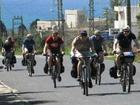The March 8 forces and Syria continue to hold onto Prime Minister-designate Najib Miqati despite an announcement by Tawhid movement leader Wiam Wahhab that he was mulling legal ways to end the nomination of the billionaire businessman, high-ranking sources said.
The sources from the new parliamentary majority told An Nahar daily in remarks published Tuesday that the March 8 forces continue to back Miqati although the cabinet formation process shook ties between several members of the coalition.
 Full Story
Full Story
United Nations Special Coordinator for Lebanon Michael Williams has expressed “shock” at the number of deaths in the border town of Maroun al-Ras when Israeli forces opened fire on demonstrators on Nakba Day on Sunday.
“I am shocked by the number of the deaths and the use of disproportionate, deadly force by the Israeli Defense Forces against apparently unarmed demonstrators,” Williams said Monday after holding talks with Premier-designate Najib Miqati.
 Full Story
Full Story
The White House said Monday it regretted the loss of life on the Lebanese-Israeli border and urged "maximum restraint" among all parties but said the U.S. ally has the right to thwart unauthorized crossings.
"We regret the loss of life and our thoughts are with the families and loved ones of those killed and wounded," spokesman Jay Carney told reporters aboard President Barack Obama's official Air Force One airplane.
 Full Story
Full Story
The Phalange Party condemned on Monday the ongoing political crisis in Lebanon, saying that it is “starting to kill the country.”
It said in a statement after its weekly politburo meeting: “As Arab people are demanding to topple the regimes in their countries, the Lebanese should demand that the system in their country be saved seeing that solutions to the crisis will not be reached any time soon.”
 Full Story
Full Story
The seven Estonian cyclists kidnapped in Lebanon in March are still alive, said a security source to the Central News Agency on Monday.
This information comes as a relief to security forces that have still not yet determined their where they are being held captive, it added.
 Full Story
Full Story
Progressive Socialist Party leader MP Walid Jumblat noted on Monday that the Nakba Day clashes that erupted at Maroun al-Ras and the Golan Heights on Sunday mark the beginning of a new Arab-Israeli conflict that will force the Jewish state to acknowledge the Palestinian people’s right to return to their homeland.
He said in his weekly editorial in the PSP-affiliated al-Anbaa magazine: “The developments in the Arab world confirm that the Palestinian people can no longer be denied their legitimate rights.”
 Full Story
Full Story
Tawhid movement leader Wiam Wahhab said Monday that he was mulling along with Free Patriotic Movement leader Michel Aoun ways to withdraw their confidence from PM-designate Najib Miqati.
Following talks with Aoun at his residence in Rabiyeh, Wahhab said that the two politicians were searching for new and legal formulas to withdraw their confidence from Miqati.
 Full Story
Full Story
President Michel Suleiman held talks on Monday with U.S. Ambassador to Lebanon Maura Connelly on the security and political repercussions of Sunday’s Nakba Day clashes between Lebanon, Syria, and Israel.
He called on the United States to urge the Jewish state to respect international laws and agreements, once again condemning its attack against unarmed civilians.
 Full Story
Full Story
Former General Security chief Jamil Sayyed’s press office announced on Monday that a French court had set a hearing in his lawsuit against former chief U.N. investigator investigator Detlev Mehlis on May 18.
Sayyed had filed a defamation lawsuit against Mehlis after the latter had adopted testimonies of false witnesses in the investigation into the assassination of former Prime Minister Rafik Hariri, which led to his imprisonment in 2005 for nearly four years.
 Full Story
Full Story
Around 300 Syrians, including several wounded people, crossed the illegal Munjaz Noura crossing into Lebanon’s northern district of Akkar on Monday to escape the violence in Syria, Voice of Lebanon radio station reported.
Among the injured was a woman who was taken to Rahhal hospital in the area, VDL said.
 Full Story
Full Story



